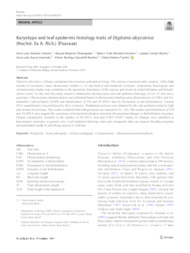Karyotype and leaf epidermis histology traits of Digitaria abyssinica (Hochst. Ex A. Rich.) (Poaceae).
Karyotype and leaf epidermis histology traits of Digitaria abyssinica (Hochst. Ex A. Rich.) (Poaceae).
Author(s): CHAVES, A. L. A.; CHIAVEGATTO, R. B.; FERREIRA, M. T. M.; ROCHA, L. C.; AZEVEDO, A. L. S.; BENITES, F. R. G.; TECHIO, V. H.
Summary: Digitaria abyssinica (African couchgrass) has economic potential as forage. This species is taxonomically complex, with a high number of synonyms, basic chromosome number x = 9, and diploid and tetraploid cytotypes. Anatomical, histological, and cytotaxonomic studies may contribute to the taxonomic description of this species and reveal its polyploidization and hybridization events. To this end, this study aimed to characterize the karyotype and leaf epidermis histology of two D. abyssinica genotypes. Chromosome characterization was performed based on chromosome banding using chromomycin A (CMA) and 4,6-diamidino-2-phenylindole (DAPI) and identification of 35S and 5S rDNA sites by fluorescent in situ hybridization. Nuclear DNA quantification was performed by flow cytometry. Paradermal sections were obtained for the leaf epidermis study by light and electron microscopy. The results confirmed that both genotypes are tetraploid (2n = 36). The number and distribution of 35S and 5S rDNA sites suggest the occurrence of postpolyploidization structural chromosomal changes or hybridization processes. Despite intraspecific variation in the number of 5S rDNA sites and CMA+/DAPI+ bands, no changes were identified in karyotypical symmetry or genome size. Leaf epidermis histology traits and cytogenetic data can support breeding programs and germplasm banks in identifying species or cultivars.
Publication year: 2020
Types of publication: Journal article
Unit: Embrapa Dairy Cattle
Observation
Some of Embrapa's publications are published as ePub files. To read them, use or download one of the following free software options to your computer or mobile device. Android: Google Play Books; IOS: iBooks; Windows and Linux: Calibre.
Access other publications
Access the Agricultural Research Database (BDPA) to consult Embrapa's full library collection and records.
Visit Embrapa Bookstore to purchase books and other publications sold by Embrapa.

